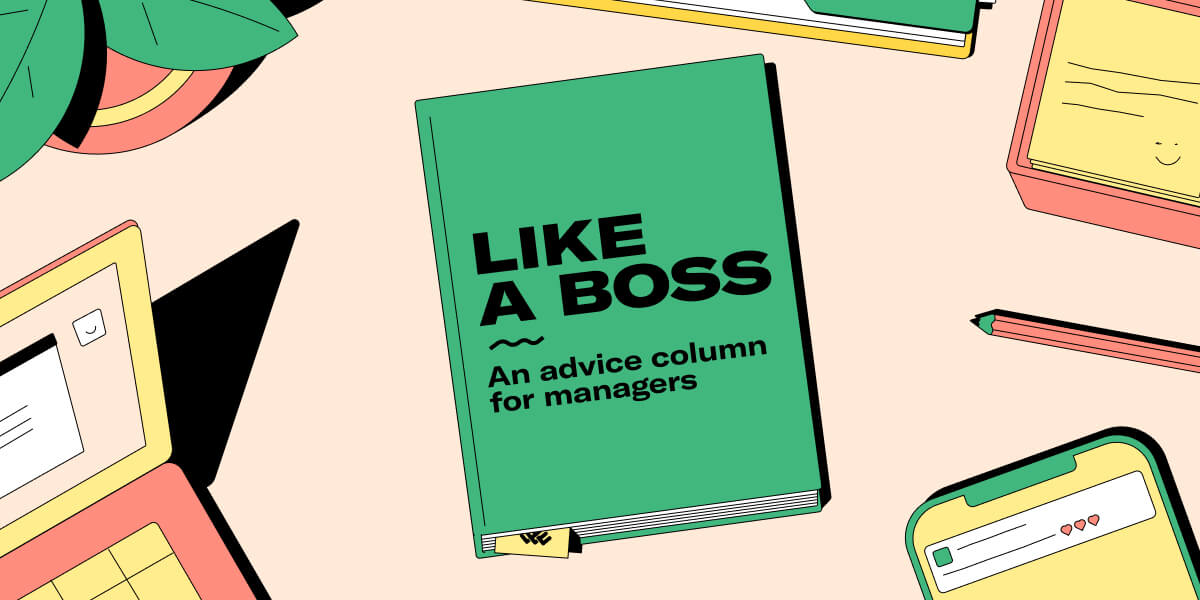Welcome to Lattice’s advice column for new managers, “Like a Boss.” I’m your host, Jennifer Romolini. I’m an editor, an author (of the career guide “Weird In a World That’s Not”), and, yes, a boss who’s been managing other humans for the past dozen or so years at companies both giant and tiny, at quick and dirty startups and multi-layered corporations, with remote and in-office teams ranging from five to 45. I’m also a speaker who talks about succeeding at work even when you feel like a freak. And, sometimes, I give advice, like right now.
Dear Boss,
I’m a manager of a team of seven smart, amazing employees at a small marketing company. We made some new hires in the fall and, earlier this year, we were really starting to gel as a team and hit our stride. But now, for us, as with everyone else, things are less clear. I’m feeling unsteady as a leader and afraid of not having enough work to give the team (right now we do, but that could change at any time). But more than anything I’m struggling — maybe for the first time in my career — with stamina and the ability to stay engaged. I dread Zoom calls and am finding it a challenge to put on a happy face and lead, but I do it every day because I know I have people who depend on me. Any advice on how to manage through this (and actually care about work right now)? I feel like giving up.
Feeling guilty as hell in Seattle
Dear Guilty,
What we’re experiencing right now is collective trauma, or as the therapists say, a social cataclysm that’s disrupted every part of our lives. There’s no correct way to cope with it — in this new world order, baking bread and hoarding hair dye are strategies on par with sleeping in and eating cake for breakfast. The idea is to survive, and, despite what all those remote workout class ads suggest, you don’t have to thrive.
So the first thing I’m going to suggest is: Be extremely nice to yourself. Be gentle and tender. Stop looking at your work during coronavirus through the lens of a performance review. This is not the time to judge your reactions or feelings, nor to attach too heavily to them. You may be thinking your strategy docs seem pointless right now, especially in the grand scheme of things. Acknowledge this. And acknowledge that your bad feelings about work don’t mean you will feel them forever. You may happily engage with your work — and even this particular job — sometime in the near future. For now not so much? That’s okay. Work is an essential part of survival, yes, a privilege, even. You have to do it, but you don’t always have to feel great about it. Let yourself off the Type-A, perfectionist hook. This may help.
As a (good) manager, you may not be used to putting your needs before those of your employees. But now is the time to start. Pay extra attention to your health — sleep well, eat healthy foods, get your heart rate up once a day if you can. Be intentional about your mental health too — take breaks often, breathe deeply, read for pleasure, make sure you’re not overworking, avoid the news for a day.
In terms of showing up appropriately as a manager? The best you can do right now is to be yourself, not some saccharin/stoic version of who you think a boss should be. Prioritize treating your employees with kindness, compassion, and understanding over KPIs. Know that you don’t have to be the team mascot/head cheerleader all of the time. You’re allowed to be honest and human.
If you’re having a hard time running meetings, give someone else on your team the opportunity to lead. Rotate meeting leaders. Shake things up. Start Zoom calls in unconventional ways. Spend the first 10 minutes talking about books, or movies, or “Tiger King” or having team members share something good that happened to them that day. Work doesn’t have to be all business right now. Embrace frivolity. Don’t try to be an anchor. Don’t think the weight of holding this thing together is solely on your shoulders — ask for help when you need it. In times of crisis, people want to help, try to remember this.
None of us knows how this crisis will change us, our workplaces, or how we fundamentally think about ourselves in the world. Though it’s certain we will be changed, that’s not necessarily for the worse. Observe the way you’re feeling about work right now. Longer term, it may be the seed of something, a positive shift in how you work or what you truly want to do next. When all else fails, find solace in the words of poet Mary Oliver: “Someone I loved once gave me a box full of darkness. It took me years to understand that this too, was a gift.”






.jpg)
